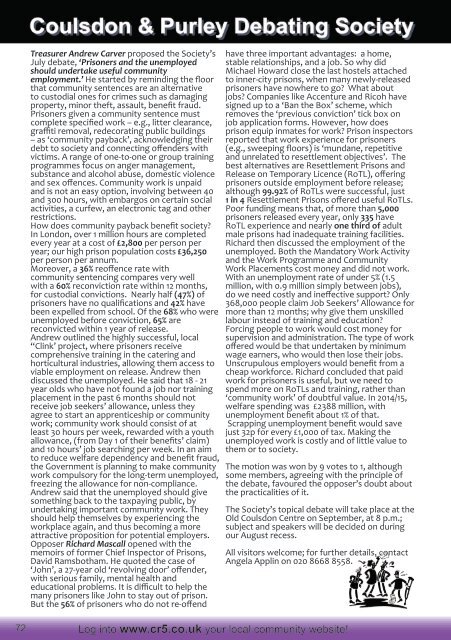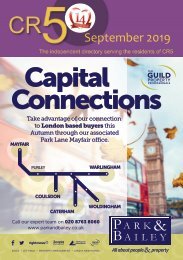CR5 Issue 147 August 2017
A free community magazine for the CR5 Postcode containing local business advertising, interesting reads, What's On in the area and puzzles
A free community magazine for the CR5 Postcode containing local business advertising, interesting reads, What's On in the area and puzzles
Create successful ePaper yourself
Turn your PDF publications into a flip-book with our unique Google optimized e-Paper software.
Treasurer Andrew Carver proposed the Society’s<br />
July debate, ‘Prisoners and the unemployed<br />
should undertake useful community<br />
employment.’ He started by reminding the floor<br />
that community sentences are an alternative<br />
to custodial ones for crimes such as damaging<br />
property, minor theft, assault, benefit fraud.<br />
Prisoners given a community sentence must<br />
complete specified work – e.g., litter clearance,<br />
graffiti removal, redecorating public buildings<br />
– as ‘community payback’, acknowledging their<br />
debt to society and connecting offenders with<br />
victims. A range of one-to-one or group training<br />
programmes focus on anger management,<br />
substance and alcohol abuse, domestic violence<br />
and sex offences. Community work is unpaid<br />
and is not an easy option, involving between 40<br />
and 300 hours, with embargos on certain social<br />
activities, a curfew, an electronic tag and other<br />
restrictions.<br />
How does community payback benefit society?<br />
In London, over 1 million hours are completed<br />
every year at a cost of £2,800 per person per<br />
year; our high prison population costs £36,250<br />
per person per annum.<br />
Moreover, a 36% reoffence rate with<br />
community sentencing compares very well<br />
with a 60% reconviction rate within 12 months,<br />
for custodial convictions. Nearly half (47%) of<br />
prisoners have no qualifications and 42% have<br />
been expelled from school. Of the 68% who were<br />
unemployed before conviction, 65% are<br />
reconvicted within 1 year of release.<br />
Andrew outlined the highly successful, local<br />
“Clink’ project, where prisoners receive<br />
comprehensive training in the catering and<br />
horticultural industries, allowing them access to<br />
viable employment on release. Andrew then<br />
discussed the unemployed. He said that 18 - 21<br />
year olds who have not found a job nor training<br />
placement in the past 6 months should not<br />
receive job seekers’ allowance, unless they<br />
agree to start an apprenticeship or community<br />
work; community work should consist of at<br />
least 30 hours per week, rewarded with a youth<br />
allowance, (from Day 1 of their benefits’ claim)<br />
and 10 hours’ job searching per week. In an aim<br />
to reduce welfare dependency and benefit fraud,<br />
the Government is planning to make community<br />
work compulsory for the long-term unemployed,<br />
freezing the allowance for non-compliance.<br />
Andrew said that the unemployed should give<br />
something back to the taxpaying public, by<br />
undertaking important community work. They<br />
should help themselves by experiencing the<br />
workplace again, and thus becoming a more<br />
attractive proposition for potential employers.<br />
Opposer Richard Mascall opened with the<br />
memoirs of former Chief Inspector of Prisons,<br />
David Ramsbotham. He quoted the case of<br />
‘John’, a 27-year old ‘revolving door’ offender,<br />
with serious family, mental health and<br />
educational problems. It is difficult to help the<br />
many prisoners like John to stay out of prison.<br />
But the 56% of prisoners who do not re-offend<br />
have three important advantages: a home,<br />
stable relationships, and a job. So why did<br />
Michael Howard close the last hostels attached<br />
to inner-city prisons, when many newly-released<br />
prisoners have nowhere to go? What about<br />
jobs? Companies like Accenture and Ricoh have<br />
signed up to a ‘Ban the Box’ scheme, which<br />
removes the ‘previous conviction’ tick box on<br />
job application forms. However, how does<br />
prison equip inmates for work? Prison inspectors<br />
reported that work experience for prisoners<br />
(e.g., sweeping floors) is ‘mundane, repetitive<br />
and unrelated to resettlement objectives’. The<br />
best alternatives are Resettlement Prisons and<br />
Release on Temporary Licence (RoTL), offering<br />
prisoners outside employment before release;<br />
although 99.92% of RoTLs were successful, just<br />
1 in 4 Resettlement Prisons offered useful RoTLs.<br />
Poor funding means that, of more than 5,000<br />
prisoners released every year, only 335 have<br />
RoTL experience and nearly one third of adult<br />
male prisons had inadequate training facilities.<br />
Richard then discussed the employment of the<br />
unemployed. Both the Mandatory Work Activity<br />
and the Work Programme and Community<br />
Work Placements cost money and did not work.<br />
With an unemployment rate of under 5% (1.5<br />
million, with 0.9 million simply between jobs),<br />
do we need costly and ineffective support? Only<br />
368,000 people claim Job Seekers’ Allowance for<br />
more than 12 months; why give them unskilled<br />
labour instead of training and education?<br />
Forcing people to work would cost money for<br />
supervision and administration. The type of work<br />
offered would be that undertaken by minimum<br />
wage earners, who would then lose their jobs.<br />
Unscrupulous employers would benefit from a<br />
cheap workforce. Richard concluded that paid<br />
work for prisoners is useful, but we need to<br />
spend more on RoTLs and training, rather than<br />
‘community work’ of doubtful value. In 2014/15,<br />
welfare spending was £2388 million, with<br />
unemployment benefit about 1% of that.<br />
Scrapping unemployment benefit would save<br />
just 32p for every £1,000 of tax. Making the<br />
unemployed work is costly and of little value to<br />
them or to society.<br />
The motion was won by 9 votes to 1, although<br />
some members, agreeing with the principle of<br />
the debate, favoured the opposer’s doubt about<br />
the practicalities of it.<br />
The Society’s topical debate will take place at the<br />
Old Coulsdon Centre on September, at 8 p.m.;<br />
subject and speakers will be decided on during<br />
our <strong>August</strong> recess.<br />
All visitors welcome; for further details, contact<br />
Angela Applin on 020 8668 8558.<br />
72 Log into www.cr5.co.uk your local community website!

















